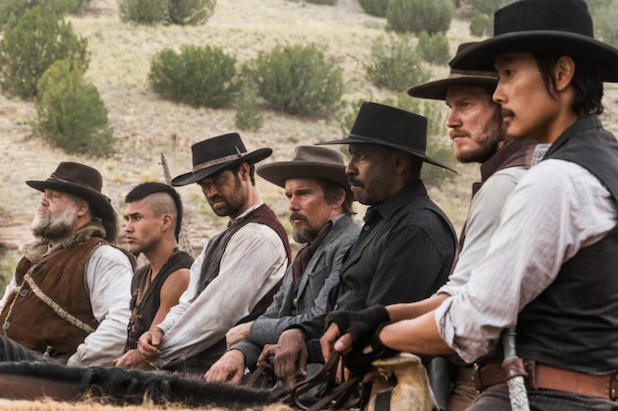The Magnificent Seven, directed by Antoine Fuqua, is a retelling of the American classic of the same title and it’s Japanese original, Seven Samurai. The plot follows Denzel Washington’s character, Chisolm, as he defends a small village from invaders. It’s up to Chisolm and an assembled gang of misfits to save the village; the seven of them against an army of thieves.
It’s telling that IMDB wrote one of the most relatable words to The Magnificent Seven is “Die Hard Scenario”. This, of course, is in reference to the classic American film trope in which a good, working class American citizen is forcefully thrust into a situation to save the damsel in distress from a villain more tied to background than character. These are the problems presented through the course of The Magnificent Seven, however, there’s hardly any innovation here.
If I’m being honest, the classic Western genre is so overplayed, even a reincarnated version of John Wayne couldn’t bring it back, let alone a cast full of unbelievably charmless stars.
It’s hard to believe that Denzel Washington and Chris Pratt could both be flat, but their acting is limited to their one-bit ideas and characters. Correct me if I’m wrong, but defining a character as a gambler, should not limit him to only cracking unfunny jokes and attempting to crassly lighten death with humor. Shouldn’t he be allowed to develop or go through more than just one moral crisis? Fuqua seems to say: “no, Chris Pratt, one of the most charismatic actor of our time does not deserve a dynamic role.” This choice seems reminiscent of the recent Jurassic World as well.
I would like to address cultural stereotypes present in The Magnificent Seven. When the trailer labels the only Asian actor as “The Assassin”, and the only “good” Native American actor as “The Warrior”, I see a problem. Hollywood using actors of color in typecasted roles based on racial and cultural stereotypes feels unethical.
Surely, there must be another way to bring actors of color into a mainstream film without giving them stereotypes to work with.
Where Chris Pratt is left with almost nothing, these actors are given even less. They are defined more by their weapons than by any dialogue or action they contribute to the film.
If these ideas weren’t enough, the trope of the bad Native American on the white thieve’s side, which some might label as an “Uncle Tom” figure, really doesn’t fit in. If the other two actors are stereotypes, this Native American character is a bit part that feels as though it fills a racial quota for some imaginary Hollywood checklist.
It’s nice to see Denzel in the lead, but surely someone can do more with the source material here. Seven Samurai is such a cinematically rich film that it makes one question how The Magnificent Seven could even attempt to be that imaginative. If Fuqua really wanted to honor the source material, why not include a Japanese actor? Why not include references other than plot points to this film’s predecessors. It’s lazy filmmaking and boring at best.
What starts out as a charming little character study, soon explodes into a gunfight of epic proportions. While this may sound like a positive comment, with The Magnificent Seven, the opposite is true.
The story presents a slew of interesting people that the audience wants to spend more time with. However, the direction of the film seems to have a different agenda. When the camera is not focused on the deaths every possible human on screen, or everything being blown to pieces, it films the characters only as plot devices, using dialogue to push an already stale story into a dreadfully clichéd ending. One that the audience is well aware of way before the conclusion of the film. This is Hollywood we’re talking about after all.
